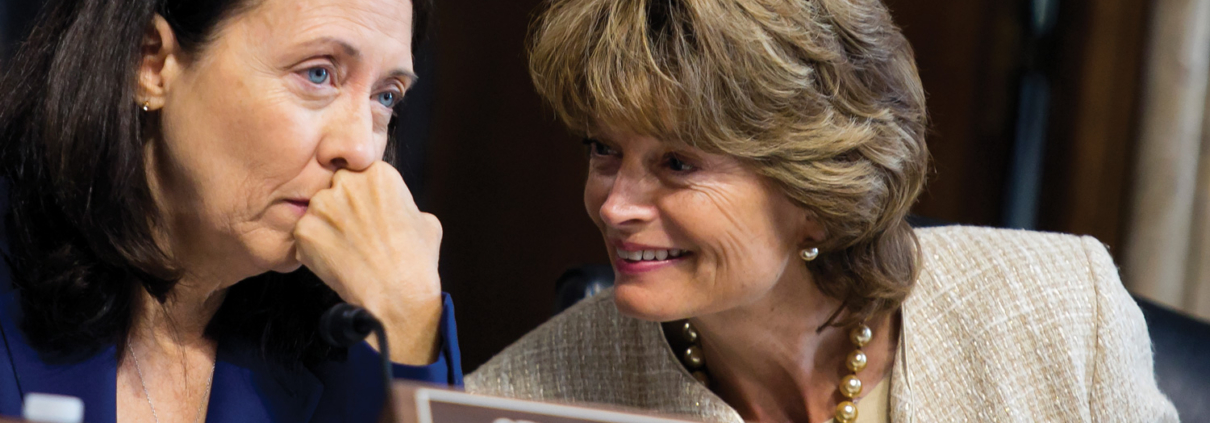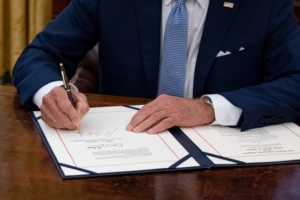Eagles vs. Drones
Here’s What You Need to Know
With the Senate Energy Bill up for a cloture vote as soon as today, here are four things you need to know:
- This is a rare case of passing a bill many Republicans and Democrats can support. The bill is co-sponsored by Senator Lisa Murkowski (R-AK) and Senator Maria Cantwell (D-WA) who are taking measures, such as limiting the scope of the bill, to achieve bipartisan consensus and a smooth process. So far, it has maintained the support of both Senate Majority Leader Mitch McConnell (R-KY) and Senate Minority Leader Harry Reid (D-NV).
- During the amendment process, Republicans have been taking aim at regulations. Environment and Public Works Committee Chairman James Inhofe (R-OK) has already introduced 16 amendments aimed at diminishing the Obama administration climate rules.
- Democrats are using the amendment process to shame Republicans. As Politico noted, “Senators of a greener turn of mind see a chance to get more work done on climate change. ‘It’s important that we try to put some real meat onto the energy bill and also use it as an opportunity to also remind people that basically every senator’s home state university is saying that climate change is real,’ [said] Rhode Island Democrat Sheldon Whitehouse …”
- Of course, Senators never let a crisis go to waste. Senate Democrats have proposed an amendment to the bill that would provide $400 million of emergency relief to the city of Flint, Michigan, which remains in a state of crisis over lead-contaminated water. The two California Democratic Senators planned to introduce an amendment that would direct the Energy Secretary to create a task force to recommend how to solve the ongoing natural gas leak near Los Angeles and prevent future incidents.
News You Can Use
SMOKING THE TRADE DEALS
Why are anti-tobacco groups supporting the Trans-Pacific Partnership? Language in the agreement blocks tobacco companies from suing when foreign governments restrict labels on cigarette packages. While this has won over Democrats in Congress, it has cost Republican votes, especially for those in tobacco-producing states like Kentucky, North Carolina, and Virginia. Meanwhile, after U.S. negotiators warned their EU counterparts that granting China “market economy” status could jeopardize the TTIP deal, an EU commission paper leaked illustrating internal concerns over potential European job losses from the move.
PAY ME TO BORROW
Last week, in a surprise move, the Bank of Japan imposed a 0.1% fee on selected current account deposits, effectively introducing negative interest rates to encourage banks to make more loans and help stimulate the Japanese economy, which USA Today notes, “is forecast to grow just 1.1% in 2015 and 1.7% in 2016.”
Subscribe to Receive Insights
"*" indicates required fields
$29 TRILLION HANGOVER
Observers of the credit market remain concerned about the potential for a coming global recession sparked by the unprecedented $29 trillion bond binge that has left corporate leverage at a 12-year high. Bonnie Baha, a money manager at DoubleLine Capital in Los Angeles, claims “We’ve never been in a cycle quite like this… It’s setting up for an unhappy turn.” With one third of companies globally failing to garner high enough return on investments to cover their cost of funding, the problem doesn’t seem likely to disappear anytime soon.
EAGLES VS. DRONES
The eagle is known in America as a patriotic symbol of freedom. But in the Netherlands, eagles are becoming known for the ability to take out rogue drones. The Dutch police have partnered with raptor training company Guard From Above to train eagles to take down drones. While the training has proven successful so far, the departments says it is still looking into methods for preventing injury to the eagles.
MEET THE SUPER PAC SAND-MAN
The New York Times reports, “More super PAC money has been spent so far in express support of Mr. Sanders than for either of his Democratic rivals …” This is a bit ironic for a candidate who has prioritized overturning Citizens United and has criticized money in politics as “corrupt and undermining American democracy.” As a spokesman for his Democratic rival, Clinton, put it, “This is one of the prime examples of Senator Sanders saying one thing and doing another.”
UBER FOR WELFARE?
Just as Uber interrupted the taxi industry, the gig economy can change how we think about social safety nets like welfare. As Cesar Conda and Derek Khanna write for The Atlantic, “The current safety net is outdated, designed for an era when work was a 9-to-5 ritual that required interviews and a résumé. The modern economy is much more complex, and the gig economy, in particular, has dramatically reduced the barriers to finding work.” Work requirements for welfare, a measure supported by 83 percent of Americans, make even more sense today with the plethora of new and part-time job opportunities the gig economy has created. Politicians should no longer attack the gig economy as a labor dilemma and instead recognize the new opportunities it offers.
REGISTERED LETTER TO THE EDITOR
On Tuesday, a state board in New York charged with cleaning up political corruption instead focused on newspapers and public relations firms, voting to require consultants who contact news media editorial boards to register as if they were lobbyists and disclose their activities. This new measure allows a government body to oversee the editorial process of our Constitutionally-guaranteed free press. As Andrew Celli, whose law firm wrote a letter opposing the change on behalf of four PR companies, said “Newspaper editorials are part of the firmament of public discussion. The idea that that is going to be overseen by an administrative body in Albany is deeply concerning.”
EQUAL PAY BLITZ
Last week, a coalition of progressive women’s groups launched a national blitz on the issue of equal pay, advancing legislation on the subject in nearly half of the country’s state legislatures on the same day. An organizer with one of the groups said they intended “to make a coordinated effort around this to try to nationalize the issue.” Many question the necessity of the measures, citing preexisting equal pay protection laws and the lack of study on the economic impact of such laws that will be sure to result in burdensome regulations for businesses, but the reality is this is simply the latest front in a broad progressive push for more regulations on businesses intended to reduce income inequality.
FLYERS’ BILL OF RIGHTS
Several travelers’ rights groups have begun a push for government regulators to secure air travel passengers’ “right to space” by mandating things like minimum seat width and pitch. But as Cato Institute’s Doug Bandow notes, if you “make every airplane a premium-economy plane and fares will rise to premium-economy levels.” As interest groups continue to push for these measures, the debate will go on over which is more important: rights to comfort or low-cost air travel. After all, if you can’t afford the ticket, does it really matter how much room you would have had on the plane?
Mark Your Calendars
February 9 – New Hampshire Primary
February 20 – Nevada Democratic Caucus & South Carolina Republican Primary
February 23 – Nevada Republican Caucus
February 27 – South Carolina Democratic Primary
Subscribe here to get TL;DR in you inbox each week.



